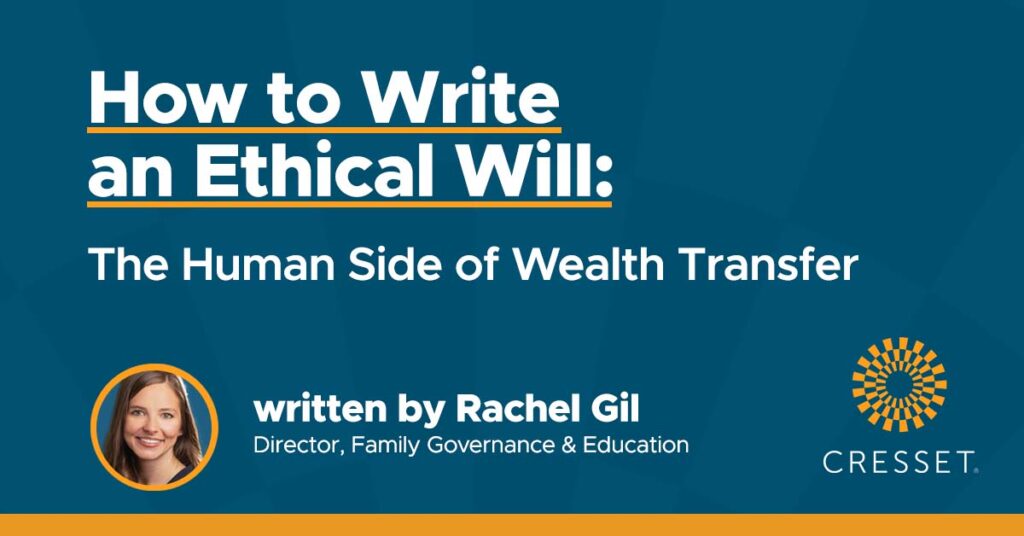
When it comes to estate planning, many families focus on the transactional side: who will get what and when. While determining how financial assets will be passed down for generations to come is critical, passing down stories, experiences, and values can be just as important for your children and future family members.
It’s these values and stories that will help guide their decision-making when you are no longer around to give advice. When the timing is right, we encourage families to explicitly share their history, values, and wishes with their loved ones. One way to reinforce this communication is via an ethical will.
What is an ethical will?
While an ethical will is not a legal document, it can serve as a letter that allows you to memorialize your personal goals and passions, family history, core values, and long-term wishes. An ethical will can help you fortify your legacy by clearly stating what is most important to you and your family.
Writing can be an iterative process, as your family grows and needs change, your document should evolve as well. You may also want to include advice or anecdotes that you have acquired throughout your life; insights around relationships and family, learnings from work, personal thoughts and beliefs – wisdom to be shared for generations.
What is the main purpose of an ethical will?
The purpose of an ethical will is to allow a person to articulate and pass their values, hopes, wishes, and lessons learned onto future generations. An ethical will is not legally binding, but may accompany a legal will to support trustees and beneficiaries in better understanding the spirit of the gift left to their care.
How To Write An Ethical Will
1. Identify core values.
Our values drive our decision-making, and while it may be intuitive to us, it can be eye-opening for your family to learn how your values have impacted your life and the decisions you have made. Drawing connections between your values and events throughout your life can help reinforce how you live these values in your day-to-day. Establishing clarity around our values not only helps guide us in making decisions, but it can also act as a compass for future generations who are navigating life’s choices and paths.
2. Define your legacy.
How do you want your capital – human, social, intellectual, and financial – to affect the next generation? What is the lasting impact that you wish to impart?
The responses to these questions are unique to each family but often start out with something like “We worked hard so that our children (or grandchildren, community, etc.) would have the opportunity to….” Sometimes the rest of that statement is focused on education, or spending more quality time together, or building up the community.
A family’s legacy can take many shapes, but is often informed by its core values and empowered by the transfer of family wealth, a family business, a foundation, or other assets from one generation to the next.
Keep in mind that your legacy can endure far beyond your own lifespan through the actions of others.
Learn more by watching our Legacy Planning for a Thriving Multi-Generational Family video.
3. Share your family history/stories.
Passing down your family history from generation to generation can help educate, empower, and engage the younger members. It is important to celebrate and capture stories about ancestors, traditions, successes, and challenges.
The “culture of the family” is the glue that keeps it together and ensures the focus is on more than money. Storytelling can be an effective way to keep the memory of your lost loved ones alive and can help the younger generation cultivate resilience and feel more connected to the family and its shared history.
4. Set family goals.
One way to strengthen your family bond is to share common goals. Family goals should be inclusive of all members in your immediate family and can help foster collaboration, effective communication, and trust. Internalizing family goals can help children learn how to develop their own personal and professional goals in the future.
Shared goals can range from committing to civic engagement, to participating in weekly family meetings, or taking an annual family vacation together – they should be achievable and focused on strengthening relationships.
5. Convey long-term wishes.
A written statement is one way to provide clear and candid instructions to your loved ones regarding your end-of-life preferences. You may want to share your funeral or memorial wishes, or you may want to provide insight into some of the decisions you have made in distributing assets to help your family avoid confusion, conflict, and hurt feelings after an inheritance. Your long-term wishes can be specific and concrete, or deeply personal and aspirational.
An ethical will can supplement your estate plan by enabling you to share your story, your values, your wisdom, and perhaps most importantly, to express love and appreciation to the people who are most important to you.
What is an example of ethical will?
Watch this ethical will video featuring our Founder and Co-Chairman Eric Becker as he chats with his sons about the impact his ethical will has had on their family legacy.
What is the difference between an ethical will and a legacy letter?
The terms “ethical will” and “legacy letter” can be used interchangeably. Another common term for an ethical will is “letter of wishes.”
Who can help me get started on my ethical will?
As an award-winning multi-family office and private investment firm, we are happy to help you through the process of writing your ethical will. Schedule your strategy session today.
